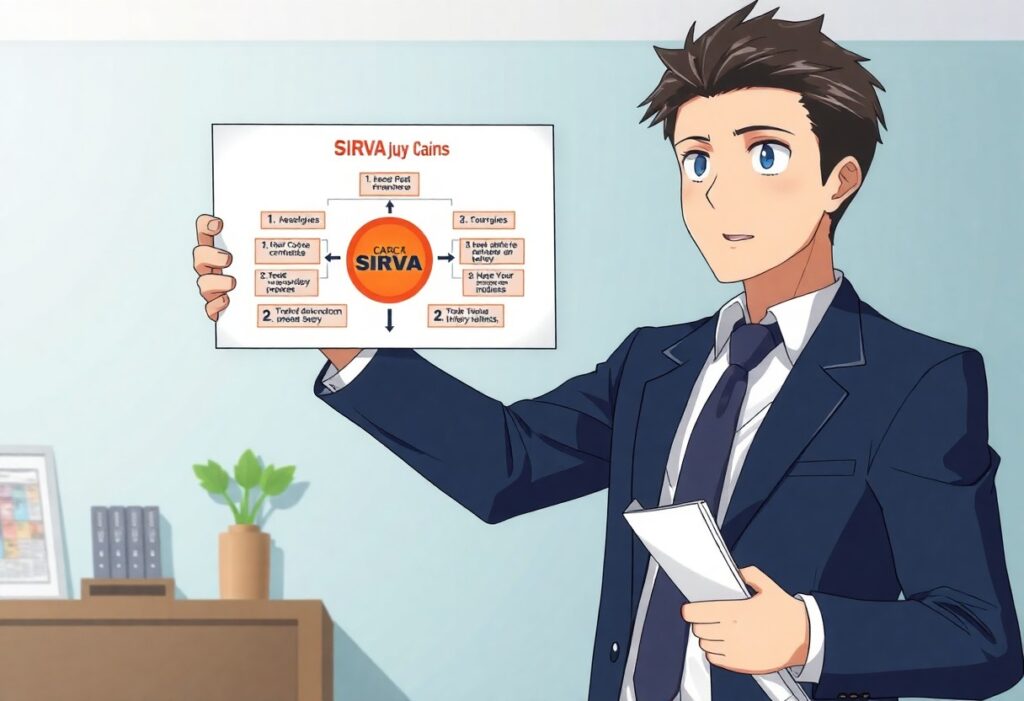Just as you begin to understand your rights and options, you might have several questions about SIRVA injury claims. These injuries, resulting from improper vaccine administration, can lead to significant discomfort and disruption in your life. In this post, we will address the most common inquiries surrounding SIRVA claims, including eligibility requirements, how to file a claim, and the potential benefits you could receive. By the end, you’ll gain clarity on navigating this process effectively and ensuring you have the support you need.
Understanding SIRVA
Your understanding of SIRVA, or Shoulder Injury Related to Vaccine Administration, is vital for recognizing its impact and addressing potential claims. This condition occurs when a vaccine is incorrectly administered into the shoulder joint, leading to a range of injuries that can affect mobility and cause chronic pain. Awareness can help you take appropriate action if you experience symptoms.
Definition of SIRVA
Across the medical community, SIRVA is understood as a specific type of shoulder injury that results from improper vaccine administration, typically due to a misplaced injection. This can result in inflammation, pain, and in some cases, more severe damage to the shoulder structures.
Symptoms and Diagnosis
Between the onset of symptoms and obtaining an accurate diagnosis, you may experience significant discomfort and confusion. Common symptoms of SIRVA include persistent shoulder pain, restricted motion, swelling, and in some cases, muscle weakness. Diagnosing this condition typically involves a thorough medical history, physical examination, and imaging studies to confirm inflammation or injury to the shoulder.
Even a minor administrative error during vaccination can lead to severe consequences, including ongoing shoulder pain and restricted mobility. It is important to consult a healthcare professional if you experience symptoms, as they may recommend treatment options that could include physical therapy or pain management strategies. Correct diagnosis is vital, as timely intervention can lead to better outcomes and help you regain full mobility. Ignoring symptoms can result in prolonged issues and worsen your health condition.
Causes of SIRVA Injuries
Some of the most common causes of SIRVA injuries include improper injection techniques during vaccination, anxiety and muscle tension in the recipient, as well as anatomical variations that may affect the administration of the vaccine. Understanding these factors can help mitigate the risks associated with SIRVA injuries and promote safer vaccination practices.
Vaccine Administration Techniques
Beside effective communication during the vaccination process, the technique used by healthcare professionals plays a significant role in minimizing the risk of SIRVA injuries. Proper needle insertion depth and angle, along with correctly identifying the appropriate injection site, are vital in ensuring a pain-free experience. This emphasizes the importance of proper training for those administering vaccines.
Other Contributing Factors
Any complications during the vaccination process can result from various contributing factors, including your personal anatomy, pre-existing muscle conditions, and even a history of previous injuries. Being aware of these factors helps in understanding your specific risks for SIRVA injuries. Perceiving the significance of these elements can lead to better informed and safer vaccination experiences.
Considering the broader picture, various elements may also play a role in the occurrence of SIRVA injuries. Your individual body mechanics, stress levels at the time of vaccination, and provider experience can all impact the outcome of the injection. Addressing these aspects ahead of time can help you mitigate risks. Perceiving these connections is vital to enhancing your vaccination experience.
Identifying Your Eligibility for a Claim
Assuming you’ve experienced pain or discomfort in your shoulder following a vaccination, you may be eligible for a SIRVA injury claim. It’s important to understand that your eligibility hinges on the specifics of your situation, including the timing of your symptoms in relation to the vaccination and the nature of your injury. Consulting with a qualified professional can help clarify your eligibility and guide you through the claims process.
Criteria for SIRVA Injury Claims
After determining that your shoulder pain developed soon after receiving a vaccine, the next step is to assess if it meets the criteria for a SIRVA injury claim. Generally, these criteria include the onset of pain within 48 hours of vaccination, the absence of a prior history of shoulder issues, and the pain being related to the vaccination technique. It’s beneficial to consult with a healthcare professional to ensure your claim aligns with these requirements.
Evidence Required for Claim Submission
An important aspect of pursuing a SIRVA injury claim is gathering proper evidence to support your case. This typically includes medical records detailing your shoulder injury, documentation of the vaccination, and any bills or treatments related to your condition.
Plus, you should collect witness statements if applicable, which can further validate your experience. It’s vital to maintain any medical appointments or therapy records that demonstrate your ongoing treatment and recovery process. A thorough compilation of this evidence will significantly strengthen your claim, establishing a clear link between your injury and the vaccination, helping you navigate the claims process more effectively.
Step-by-Step Claim Process
All SIRVA injury claims involve a multi-step process that ensures you receive proper compensation. Understanding each step can simplify your journey. Here’s a breakdown of the process:
| Step | Description |
| 1 | Document your injury and gather evidence. |
| 2 | File the claim with the appropriate insurance company. |
| 3 | Submit medical records and treatment documentation. |
| 4 | Respond to any requests for additional information. |
| 5 | Receive a decision on your claim and assess your options. |
Filing a Claim
The filing process begins with gathering all pertinent information related to your SIRVA injury. This includes medical records, incident details, and any witness statements. Ensuring accuracy in your documentation is vital, as it strengthens your claim and helps expedite the review process.
Common Pitfalls to Avoid
With each claim, there are specific pitfalls that can delay or jeopardize your compensation. Being aware of these can save you time and frustration.
Pitfalls include failing to collect adequate evidence, not meeting submission deadlines, or providing incomplete medical records. Additionally, overlooking the details in your claim can lead to denials or a reduced settlement amount. It’s important to thoroughly document your injury and treatment timeline while staying organized throughout the process. By avoiding these mistakes, you can significantly increase your chances of a successful claim outcome.
Compensation for SIRVA Injuries
Now that you understand SIRVA injuries, it’s important to consider the compensation you may be entitled to. Depending on the specifics of your case, you could receive financial support covering your medical expenses, lost wages, and pain and suffering. Having a knowledgeable attorney can help you navigate the complexities of SIRVA injury claims, ensuring you receive fair compensation for your injuries.
Types of Damages Available
Around your SIRVA injury claim, several types of damages may be available to you:
| Economic Damages | Compensation for medical bills and lost wages |
| Non-Economic Damages | Compensation for pain and suffering or emotional distress |
| Future Damages | Compensation for ongoing medical care and lost earning capacity |
| Punitive Damages | Aimed at punishing the party at fault |
| Settlement Amounts | Compensation agreed upon through negotiation |
Perceiving the types of damages can help you strategize the best approach to maximize your compensation.
Average Settlement Amounts
One key aspect of SIRVA injury claims is the average settlement amounts, which can vary significantly based on each case’s circumstances. You may find that settlements range from a few thousand to even hundreds of thousands of dollars, depending on factors such as the severity of your injury and lost wages.
To give you a better understanding, the average settlement amounts for SIRVA claims are usually influenced by medical expenses, wage loss, and long-term disability. Cases involving long-term health issues or extensive medical treatment typically result in higher settlement amounts. While some simpler cases might settle for a smaller sum, the potential for significant compensation can exist if there are documented ongoing issues related to your SIRVA injury.
Frequently Asked Questions
Once again, many individuals have specific inquiries regarding SIRVA injury claims. Understanding these common questions is necessary for navigating the claims process effectively. This section will break down the fundamental aspects of SIRVA claims, helping you gain clarity on your situation and what to expect as you pursue your rights.
Common Queries About SIRVA Claims
Frequently, you may need answers about how SIRVA injuries occur, what compensation is available, and the timeline for claims processing. Knowing these details can empower you in your pursuit of justice and ensure you make informed decisions regarding your health and finances.
Myths vs. Facts
Before diving deeper, it’s important to separate myths from facts surrounding SIRVA claims. Misunderstandings can lead to confusion and hinder your chances of securing fair compensation for your injury. Clearing up these misconceptions can empower you to take the right steps moving forward.
Facts about SIRVA claims can significantly influence your understanding and approach. Some believe that all shoulder injuries are SIRVA, which is misleading; proper diagnosis is necessary. Another myth is that you cannot file a claim without clear evidence, but even circumstantial evidence can support your case. Additionally, while many think claims are always denied, they can be approved with the right documentation and legal help. Knowing these truths allows you to take informed actions towards recovering your rights and health.
Final Words
Drawing together the insights shared about SIRVA injury claims, you now have a clearer understanding of what to expect throughout the process. Understanding how these injuries occur, knowing your rights, and being prepared with the necessary documentation will empower you in seeking appropriate compensation. Should you have further questions or require assistance, consulting a knowledgeable attorney can greatly enhance your chances of a favorable outcome. Your path to recovery and justice begins with being informed and prepared.


















